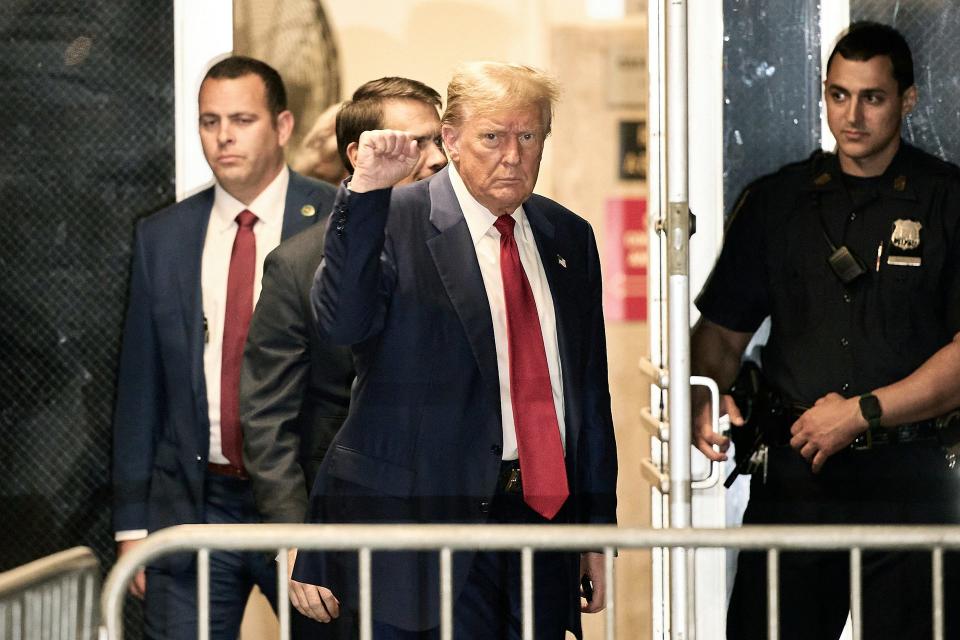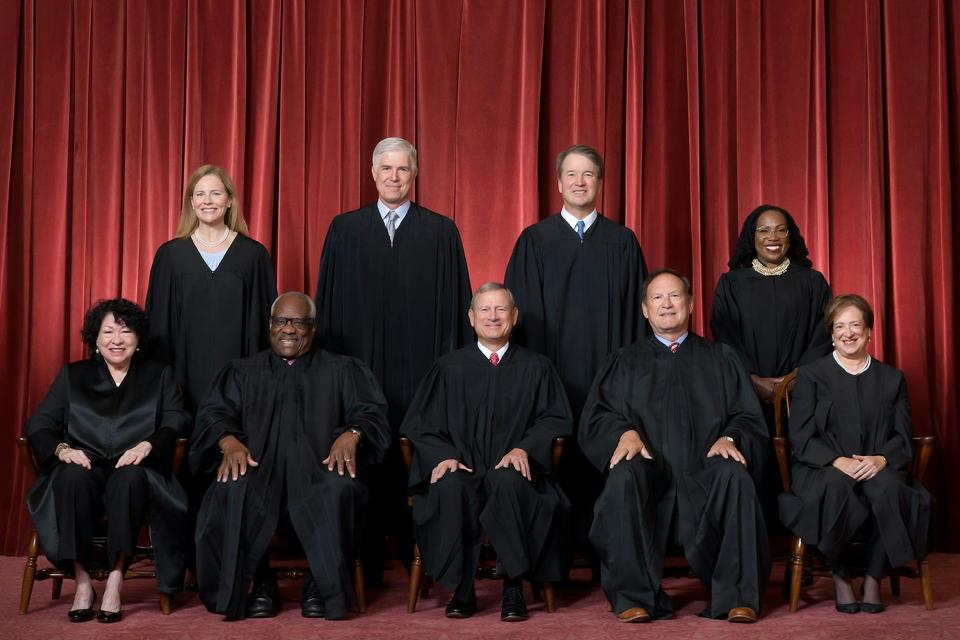There was a lot of press attention to Trump’s immunity hearing at the Supreme Court building on April 25, 2024. (Mandel NGAN/AFP/Getty Images)
Following the almost three-hour oral argument on presidential immunity at the Federal Supreme Court on April 25, 2024, many commentators were horrified. The general theme among both legal and political experts was a “how dare they” exaggerated assessment of the questioning by the mostly conservative judges of the lawyers who appeared before them in the case known as Trump v. U.S.
Instead of a deep, focused dive into the details of Trump’s attempt to subvert the 2020 election, virtually all nine justices raised larger questions, peppered with hypotheticals — hello again, Select the sixth team! – about the scope of executive powerthe intent of the nation’s founders and how best to promote a stable democracy.
Judge Brett Kavanaugh “I’m not focused on the here and now of this case” and Justice Neil Gorsuch’s “We’re Writing a Forever Rule” drew particular attention.
The title and subtitle of the New York Times analysis by Supreme Court reporter Adam Liptak complained that the court had taken “Trump’s immunity arguments in an unexpected direction” with “very little about the President’s conduct.” And history itself bristled at the fact that the justices responded to Trump’s assertion that he should not face charges as a “heavy and difficult matter.”
Slate’s Amicus Podcast condemned the court by not focusing on the “narrow issue” the case presented, instead it “went off the rails” and “jumped all over the map” with various legal arguments. A guest on NPR’s 1A lamented that the court had “injected new questions” into the oral arguments to “slow down” the case and avoid Trump to face trial before the elections.
But here’s what the experts seem to have forgotten: What happened that day in court shouldn’t have surprised anyone, especially those constitutional scholars like me familiar with Supreme Court procedure.
Donald Trump’s lawyers told the Supreme Court that a president’s actions should be immune from criminal prosecution. (Curtis Means-Pool/Getty Images)
Five words ‘change everything’
Trump’s case resulted his prosecution by Special Counsel Jack Smith for his alleged attempts to overturn the 2020 presidential election. Trump claimed that he, as president, was immune from prosecution and took his case to the Supreme Court.
When parties appeal their case to court, they must tell the judges what specific legal question or questions they want the judges to answer. As a colleague and I explored in a recent academic journal article, the court generally accepts what is called “Questions presented”As given, agreeing to hear a case without making any adjustments to its legal framework.
Sometimes, however, the court changes the legal question in some way. Why this happens is a question that scholars like me are just beginning to explore. And because it is that question – and not the one the litigant initially asked – that frames the legal analysis, judges can exercise real control over both the case itself and the development of the law.
Trump v. The United States is a classic example. When the former president’s lawyers presented his request to the courtthe question they presented was “Whether the doctrine of absolute presidential immunity includes immunity from criminal prosecution for the official acts of a president.”
When granting the petition at the end of February 2024, the court changed this language to “If and if so, to what extent does a former president enjoy presidential immunity from criminal prosecution for conduct allegedly involving official acts during his term in office.”
Five of those additional words – “if so, to what extent” – changed everything. They sent a signal clear as day that the court would go far beyond a simple yes or no on whether Trump could be prosecuted.
The nine-judge Supreme Court plenary heard oral arguments in the immunity case. (United States Supreme Court)
The court doing its job
With their reformulation of the question, the judges would instead be determining how, when and for what acts any president could be held criminally responsible.
This is a much broader inquiry, which necessarily involves formulating a legal test to draw a line between what is constitutionally permitted and what is not. The fact that the justices spent oral arguments trying to do just that isn’t a problem, let alone an outrage: It’s just the court, the nation’s highest court of appeals, doing its job.
The scope of the argument, the scope of the upcoming opinions and the time it takes the justices to write them, and the possible disappearance of Trump’s indictment are not at all shocking. The court signaled it would address the broader issue months ago when it took up the case; the time to blame the court for defending more than just Donald Trump was then, not now.
But perhaps the commentators’ response to the oral argument could be a good lesson. Americans are Told to take Trump at his wordhoping his second term will contain all extremes he happily says yes.
When the Supreme Court indicates what legal question it will answer, the smart response is to do the same thing – pay attention and believe. This may not make the end result any less unpleasant for many, but at least it won’t be as upsetting.
This article was republished from The conversation under a Creative Commons license. Read the original article.
Claire Wofford holds the position of associate professor and is also director of the pre-law advising program at the College of Charleston. Through its opinion section, Kansas Reflector works to amplify the voices of people who are affected by public policy or excluded from public debate. Find information including how to submit your own comments, here.
GET THE MORNING NEWS DELIVERED TO YOUR INBOX
The post What the Supreme Court is doing right when considering Trump’s immunity case appeared first on Kansas Reflector.





































